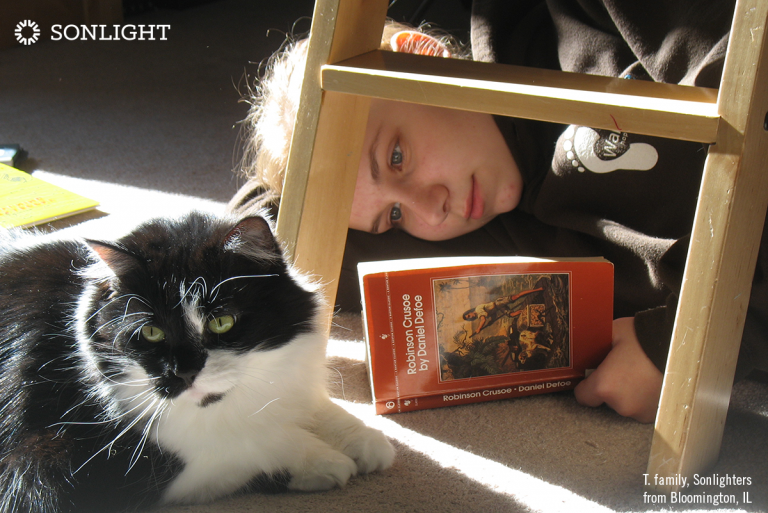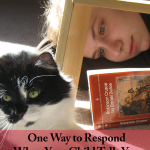
Sonlight helps you practice talking together with your kids about opposing viewpoints and tricky topics such as poverty, so that when your children want to talk about their own hard things, it all feels more natural. From the earliest programs, the books and discussion questions you share with your children open up all sorts of meaningful conversations.
Maintaining open communication with our children has always been a very high priority for John and me in our parenting. We certainly aren’t perfect, but we strive to create safe places for our children to talk through what they’re thinking, even if we disagree with their conclusions. Especially in the teenage years, we strongly preferred to have difficult conversations with them and hear their hearts, instead of having them process the same things exclusively with their peers.
What to Say When Your Child Says Something Hard to Hear
In that light, here’s a helpful tip I’d like to share. If you need a response at the ready when your children tell you something difficult for you to hear, try this:
Thank you for being willing to tell me that.
This is a true statement that invites further conversation. I assume that you are grateful, after all, that your child chose to tell you. You may not be excited to hear the revelation they shared, but if they are already thinking it, you would rather hear it than not. You do indeed want a real conversation about this. So this statement helps you start off with a true, safe response that tells your child they can be honest with you.
This can be a good first response, whether your 10-year-old comes to tell you he cheated in a ball game, or your 16-year-old is trying to tell you she’s not sure what she thinks about God. Know that it took courage for your children to tell you.
Listen in Love
When your kids open up to you, the first thing they need is for you to listen. That can be very hard when your first natural reaction would be to scream, shudder, or quote Bible verses, telling them why they’re wrong. They probably already know what you believe about the issue. They probably even know the Bible verses you want to share with them. And there will be time to share those things, but what they need first is to know it is safe to tell you this scary thing. They need to know that you still love them and you care about their heart and you want to know what they’re thinking.
So as a shortcut to helping start the conversation off on the right foot, remember this line: Thank you for being willing to tell me that. That gives you and your child a moment to take a breath and remember that you are in relationship with one another. It sets you up to approach things from a place of care and respect as you prepare to listen.
Relationship Give Us the Avenue to Impart Wisdom
You are a crucial guide for your child. And as we all know, the only way you’ll be invited to stay part of the conversation happening in your child’s heart is if you can respect your child throughout it, even if you disagree with them. In the end, your greatest gifts to your children are your presence, your love, and your wisdom. And we must present our wisdom in the context of relationship and love or it will most likely fall on flat ears.
I’ll be vulnerable here and say that I, too, have had my fair share of very difficult conversations with my children. I know the pain when a child says they believe something different than what I hold so dear. And I know the reward of choosing to stay in relationship with the child and stay in their life through love and genuine care for who they are as a person.
Here are some examples to help you imagine some surprising things you may get to respond to someday:
- ”Mom, I look gross. I hate the rolls on my stomach. I am so fat. Why did God make me like this?”
- ”When I turn 18, I’m going to tattoo my entire arm, and there’s nothing you can do to stop me.”
- ”Mom, there’s something I’ve been wanting to tell you, but you might get really mad. Um … I’m not sure I believe in God.”
- ”Hey Mom, you know that girl from co-op? I think she’s so cute! I’m going to ask her out.”
- ”I’m so sick of homeschooling. I just want to be with my friends. I really, really, want to go to public school next year.”
Regardless of what your internal reaction may be, this could be the first thing out of your mouth in all these situations: “Wow, thank you for being willing to tell me that.”
Then of course you could say something else that opens up further conversation, such as “It sounds like this has been really hard for you lately,” or “Tell me more about that,” or “Would you like to say more about what’s on your mind?”
Testing the Boundaries of Love
Sometimes our children just want to test something out with us. What will you say if they say they’re going to dye their hair blue? Is there something they could do to get outside your love? Like toddlers deliberately testing the boundaries to see what will happen, children and teenagers sometimes just need to see how we’ll react.
And of course, sometimes it’s more serious than that. Even when the parents do everything right, each child is their own person, responsible for their own decisions. And sometimes all we can do is continue to pray for God’s love and truth to penetrate our children’s hearts.
If you are in a difficult season with one of your children, know that I pray for parents in your situation. It can be so hard to watch someone you love more than words make damaging decisions. If you would like me to pray specifically for you, don’t hesitate to email me at president@sonlight.com.
God bless you as you walk this high and worthy calling of parenting. And thank you for being willing to hear your children. What a beautiful gift to them.






